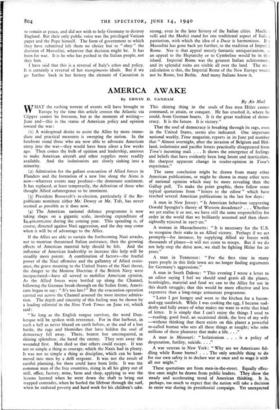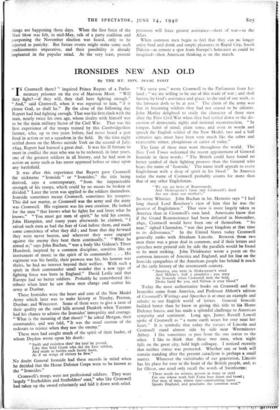AMERICA AWAKE
By ERWIN D. CANHAM
WHAT the rushing torrent of events will have brought to Europe by the time this article crosses the Atlantic via Clipper cannot be foreseen, but at the moment of writing— June 2nd—this is the status of American policy and opinion toward the war : (1) A widespread desire to assist the Allies by more imme- diate and practical measures is sweeping the nation. In the forefront stand those who are now able to advocate American entry into the war—they would have been silent a few weeks ago. Then comes the bulk of opinion and leadership, anxious to make American aircraft and other supplies more readily available. And the isolationists are slowly sinking into a minority.
(2) Admiration for the gallant evacuation of Allied forces in Flanders and the formation of a new line along the Aisne is now—whatever events may produce—the dominant sentiment. It has replaced, at least temporarily, the defeatism of those who thought Allied submergence to be imminent.
(3) President Roosevelt's re-election, particularly if the Re- publicans nominate either Mr. Dewey or Mr. Taft, has never seemed as possible as it does- now.
(4) The American national defence programme is now taking shape on a gigantic scale, involving expenditure of $4,400,000,000 during the coming year. This spending is, of course, directed against Nazi aggression, and the day may come when it will be of advantage to the Allies.
If the Allies are able to sustain the forthcoming Nazi attacks, not to mention threatened Italian assistance, then the growing effects of American material help should be felt. And the influence of American leadership to increase this help will be steadily more potent. A combination of factors—the fearful power of the Nazi offensive and the gallantry of Allied resist- ance, the grave meaning to the United States of the Nazi threat, the danger to the Monroe Doctrine if the British Navy were incapacitated—have all served to mobilise American opinion. As the Allied forces were bottled up along the Channel, following the German break-through on the Sedan front, Ameri- cans began to say: " It's too late!" But the evacuation operation carried out across the Channel aroused the most intense admira- tion. The depth and sincerity of this feeling may be shown by a leading editorial in the New York Times on June 1st, which said: " So long as the English tongue survives, the word Dun- kerque will be spoken with reverence. For in that harbour, in such a hell as never blazed on earth before, at the end of a lost battle, the rags and blemishes that have hidden the soul of democracy fell away. There, beaten but unconquered, in shining splendour, she faced the enemy. They sent away the wounded first. Men died so that others could escape. It was not so simple a thing as courage, which the Nazis had in plenty. It was not so simple a thing as discipline, which can be ham- mered into men by a drill sergeant. It was not the result of careful planning, for there could have been little. It was the common man of the free countries, rising in all his glory out of mill, office, factory, mine, farm and shop, applying to war the lessons learned when he went down the shaft to bring out trapped comrades, when he hurled the lifeboat through the surf, when he endured poverty and hard work for his children's sake. By Air Mail This shining thing in the souls of free men Hitler cannot command, or attain, or conquer. He has crushed it, where he could, from German hearts. It is the great tradition of demo- cracy. It is the future. It is victory."
That the soul of democracy is breaking through its rags, even in the United States, seems also indicated. One important national weekly, Time magazine, reports in its June 3rd number that " Almost overnight, after the invasion of Belgium and Hol- land, isolationist and pacifist letters practically disappeared from Time's incoming mail. . . . It shows the emergence of feelings and beliefs that have evidently been long latent and inarticulate, the sharpest apparent change in reader-opinion in Time's experience."
The same conclusion might be drawn from many other American publications, or might be shown in many other tests of national opinion which may be more revealing than the Gallup poll. To make the point graphic, there follow some typical quotations from " letters to the editor " which have reached several American publications in the last few days : A man in New Jersey: " Is American behaviour supporting Oswald Spengler's theory of Western decadence? . . . Whether we yet realise it or not, we have still the same responsibility for order in the world that we brilliantly assumed and then short- sightedly rejected in 1917-20."
A woman in Massachusetts: " It is necessary for the U.S. to recognise their stake in an Allied victory. Perhaps if we act promptly—for instance, by supplying Allied air forces with thousands of planes—it will not come to troops. But if we do not help stop the drive now, we shall be fighting Hitler for 20 years."
A man in Tennessee: " For the first time in many years people in this little town are no longer finding arguments for Germany's aggressions."
A man in South Dakota: " This evening I wrote a letter to an editor saying I feel we should send gratis all the planes, bombsights, material and food we can to the Allies for use in this death struggle; that this would be more effective and less expensive than a long-range armament programme.
" Later I got hungry and went to the kitchen for a bacon- and-egg sandwich. While I was cooking the egg, I became sud- denly and fully aware of what makes me want to write that kind of letter. It is simply that I can't enjoy the things I used to —reading, good food, an occasional drink, the love of my wife —without thinking that there exists on this planet a powerful so-called human who sets all these things at naught; who robs millions of these pleasures that make a life. . ."
A man in Missouri: " Isolationism . . . is a policy of desperation, futility, suicide. . . ."
A war veteran in New York: " Why are we Americans fid- dling while Rome burns? . . . The only sensible thing to do for our own safety is to declare war at once and to wage it with all our might."
These quotations are from men-in-the-street. Equally effec- tive ones might be drawn from public leaders. They show the steady and accelerating trend of American thinking It is, perhaps, too much to expect that the nation will take a decision to enter war during its presidential campaign. Yet unexpected things are happening these days. When the first force of the Nazi blow was felt, in mid-May, talk of a party coalition and postponing the November election was heard, only to be rejected as panicky. But future events might make some such readjustments imperative, and their possibility is already implanted in the popular mind. At the very least, present pressures will force greater assistance—short of war—to the Allies.
When common men begin to feel that they can no longer enjoy food and drink and simple pleasures in Rapid City, South Dakota—as remote a spot from Europe's holocaust as could be imagined—then American thinking is on the march.































 Previous page
Previous page